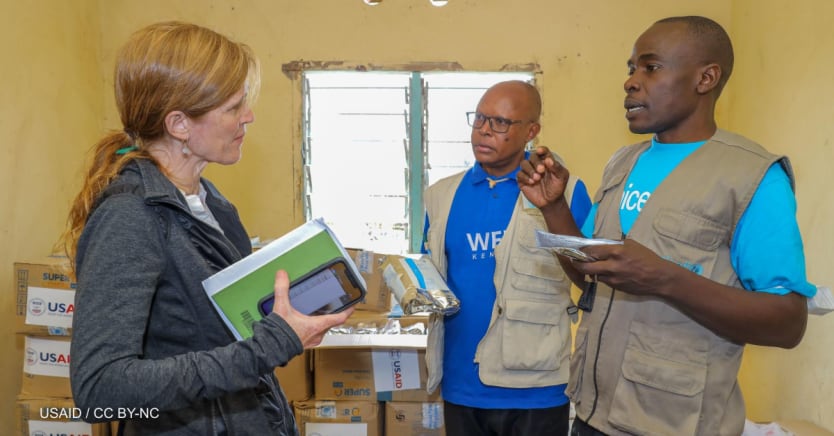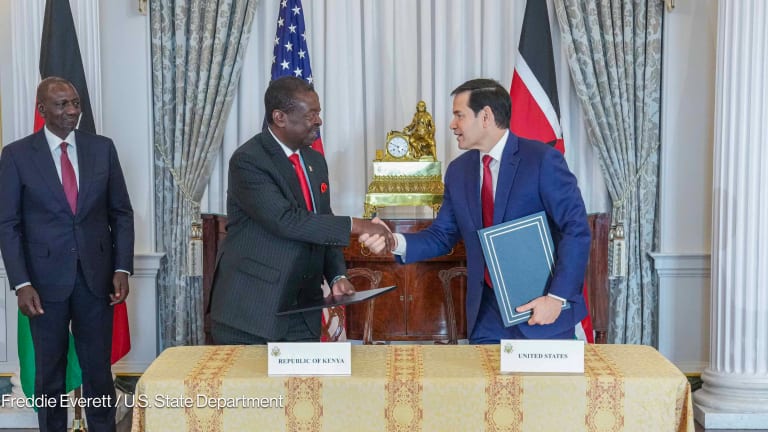
The U.S. Agency for International Development will launch a regional initiative to direct more funding to local organizations based in sub-Saharan Africa, USAID Administrator Samantha Power announced Monday.
It will be modeled after a similar effort USAID is undertaking in Central America known as Centroamérica Local, which has set aside $300 million over five years to address the drivers of irregular migration from El Salvador, Guatemala, and Honduras to the United States.
“Based on what we’ve learned in Central America, today I’m announcing a new, similar regional approach in sub-Saharan Africa — the Africa Localization Initiative. Working together with our partners in Congress, we intend to set aside funding exclusively to work with local organizations across the continent and elevate their leadership as we work to achieve shared goals,” Power announced at an event hosted by Peace Direct in New York City during the United Nations General Assembly.
Power did not specify a funding amount or time frame for the new Africa-focused initiative but said more details would be forthcoming.
USAID’s programs in Central America have operated under a bright political spotlight due to the White House’s strong interest in using development assistance to curb irregular migration. While that has created an opportunity for USAID to pilot direct local funding in the region, it has also brought political pressure to the agency’s programming and in some cases made genuine partnership with local organizations difficult to achieve.
Power noted Monday that increasing the amount of direct funding to local organizations to 25% of the agency’s program budget is only one part of her locally led and inclusive development agenda. The second goal aims to put communities in the lead of program design, implementation, or evaluation for at least 50% of USAID’s programming.
“Putting this into practice could be as simple as translating USAID solicitations into local languages so more organizations can apply. Or it can be as complex as infusing local customs and expertise into our programs,” Power said Monday.
She described a project in Guatemala’s Western Highlands where USAID’s partners are using traditional Mayan healing practices to help survivors recover from sexual, gender-based and domestic violence.
The Pro read:
Exclusive: How USAID will define 'local' in its funding targets
Under Samantha Power, the U.S. Agency for International Development has an ambitious plan to direct more funding and power to local organizations. How ambitious will depend in part on how the agency defines the terms of its commitments.
Power said one of the barriers USAID has faced in past efforts to pursue locally led development is an understanding of project risk that limits officials’ ability or appetite to look outside the community of traditional partners, which tend to be U.S.-based or international NGOs.
“Working with new players, by definition, comes with new risks,” Power said.
“To be frank, there is a risk in any kind of partnership, and working with established partners who know the ins and outs of USAID risks missing out on opportunities where we could be supporting the local changemakers who are best positioned to advance progress in their communities. A low appetite for risk, as traditionally understood, can stifle new ways of working,” she added.
Last month, USAID released a revised agency-wide Risk Appetite Statement that reflects a broader conception of risk and clarifies that the agency has “a high appetite for taking smart and disciplined risks in working with local partners, which we know will lead to more equitable and sustainable development outcomes over time,” Power said.
Search for articles
Most Read
- 1
- 2
- 3
- 4
- 5








